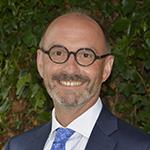Optometrist Gordon Ilett, as of October 2018, become the new chairman of charity SeeAbility. The charity is registered as the Royal School for the Blind and will celebrate its 220th anniversary next year. SeeAbility has 26 care settings across the UK and started off as a school teaching poorer blind people how to look after themselves.
Ilett’s start in optometry was a result of him not wanting ‘to chop up bodies or work as a medic.’ He was working as an optometrist and a partner in a group of practices in Bexley, Sevenoaks and Chislehurst, when he realised that the medical notes of people released from institutional settings in Bexley did not follow them to their new practices. ‘I decided to help sort the problem out and my philanthropy has stemmed from there really,’ says Ilett. ‘I believe disabled people have a right to a state-funded eye examination that has been appropriately adjusted in terms of either time or setting. Optometrists have the capability to do this, but do not always have the financial capacity, often because of a lack of government funding. That’s why we’re training more optometrists to make adjustments for people with disabilities.’
Ilett has now sold the business he was a partner at and works across all of its practices a few times a week. He worked across South East London NHS Trust hospitals for 17 years, is also on the board for the Association of Optometrists and is due to become the chairman of the Optometric Fees and Negotiating Committee next year.

Ilett (pictured) became involved with SeeAbility 10 years ago after he started to help look after people with juvenile Batten’s disease, which affects vision. The charity has a care setting in Hampshire dedicated to helping people with this disease, with specialised nurses who offer care. ‘People who come to us with juvenile Batten’s disease tend to live longer due to the extra care we can provide for them,’ says Ilett. ‘I have been working for many years to raise awareness of the importance of eye care for people with learning disabilities. I’m incredibly proud to be supporting their work to shape better eye care for future generations.’
He worked his way up the ranks to become an adviser and trustee, as well as working as an adviser to the Special Olympics in the USA. Ilett says: ‘The Special Olympics were founded by Eunice Kennedy Shriver, sister of former president John F Kennedy, for adults and children with disabilities. I worked with the team to provide athletes with eye examinations and many other healthcare tests. I also worked with optometrists and educationalists to distribute a video called Opening eyes to intellectual disabilities, which helps to educate healthcare professionals on the best ways to look after and treat people with learning disabilities.’
SeeAbility’s aim as a charity is to look at how care is provided to disabled people, encourage people to rethink disability and to champion and deliver support and services for people with disabilities ranging from autism to sight loss. ‘There is an increasing amount of care in the homes of some disabled people in the form of their friends and family but people on the higher end of the spectrum need more help, which is where we can help,’ says Ilett. ‘We’re working with the Department of Health to launch a new eye care and vision strategy to help look after people with autism who were kept in care settings against their will and we also have a new campaign called Children in Focus, which is about trying to ensure children in special needs schools still have access to eye examinations when they first start. These children have the same rights as others to have an eye examination, we don’t want people with disabilities to be excluded.’
Ilett recently undertook the task of cycling 700 miles to visit all of SeeAbility’s care centres in a week. ‘It was fantastic. I was met at one centre by everyone who works and is cared for there. It was so uplifting, and I was quite moved by seeing everyone we support and the staff that do such a good job.’
He encourages anyone who wants to get involved with the charity to get in touch via the website. ‘We have a high profile in the eye care industry now and if our message and profile is widened and spread further, we can get more awareness and more funding. We want to empower employees and help us where they can. It’s a challenging conversation but one we need to have. The nation depends on people being able to see well, so optometrists are invaluable.’
